|
|
|
Sort Order |
|
|
|
Items / Page
|
|
|
|
|
|
|
| Srl | Item |
| 1 |
ID:
189356
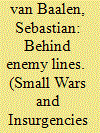

|
|
|
|
|
| Summary/Abstract |
This article examines the conditions that foster state-insurgent cooperation in rebel governance. State-insurgent cooperation is puzzling because it can alienate hardliners, undermine the parties’ legitimacy, reveal sensitive information, and cause autonomy losses. We propose that conflict parties are more likely to discount these costs when they have overlapping civilian constituencies with high governance provision expectations. Analysing rebel governance in Côte d’Ivoire and Sri Lanka using original data, we find that civilian expectations prompt cooperation even when the parties appeal to separate constituencies. The article nuances existing theories of rebel governance and contributes new knowledge on state-insurgent interactions in civil war.
|
|
|
|
|
|
|
|
|
|
|
|
|
|
|
|
| 2 |
ID:
180199
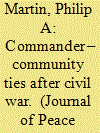

|
|
|
|
|
| Summary/Abstract |
Ex-rebel military commanders play a central role in peacebuilding after civil war. Yet the influence and mobilization power of these actors is not uniform: in some areas commanders retain strong ties to civilian populations after war’s end, while in other areas such ties wither away. This article analyses a novel dataset of former rebel-occupied localities in Côte d’Ivoire to investigate why commander–community linkages endure or decline after post-conflict transitions. The findings support a theory of political accountability: commanders retained political capital and access to networks of supporters in areas where insurgents provided essential goods to civilians during war. By contrast, where insurgents’ wartime rule involved abuse and coercion, commanders were less likely to sustain strong ties. These findings challenge the conventional wisdom that violent warlordism explains the persistence of rebel commanders’ power in peacetime. Rather, effective wartime governance may create regionally embedded strongmen who can in turn disrupt postwar state-building.
|
|
|
|
|
|
|
|
|
|
|
|
|
|
|
|
| 3 |
ID:
159964


|
|
|
|
|
| Summary/Abstract |
This article examines the perceptions of domestic actors in international governance and state-building interventions. To further decentre a research field that has so far focused primarily on the perceptions and representations of actors in the Global North, the article reconstructs how a specific set of domestic actors sees the presence of donors in international interventions and their own interactions with them. Drawing on recent advances in relational sociology, our analysis focuses on how domestic intermediary actors in two post-war political settings exposed to external state-building interventions conceive of and navigate their social relations with the interveners. We find that they frequently view interveners as mainly interest-oriented, bureaucratic and erratic actors. In contrast to studies that posit a clear-cut and static hierarchy between Northern interveners and Southern targets of interventions, the article moreover paints a more nuanced picture of the interactions and relations between interveners and ‘the intervened upon’. The article illustrates its argument by drawing on a series of problem-centred and expert interviews in Côte d’Ivoire and Lebanon.
|
|
|
|
|
|
|
|
|
|
|
|
|
|
|
|
| 4 |
ID:
165232


|
|
|
|
|
| Summary/Abstract |
This article examines the 2017 Jewish conversions in Côte d’Ivoire, and explores some of the Ivorian Jewish-related efforts in their historical context. The article addresses cultural, gender, and various political aspects of the issue arena. It also considers the changing relationship between Israel and the Israeli embassy with these communities. Finally, this work contemplates issues related to North-South Jewish relations and, more generally, the discourse concerning conversion as an option for people who are involved in this phenomenon. The context of the 2017 Ivorian conversions is an excellent example of numerous and crosscutting pressures as well as aspirations that are operative today in relation to the Jewish phenomenon in sub-Saharan Africa.
|
|
|
|
|
|
|
|
|
|
|
|
|
|
|
|
| 5 |
ID:
141230
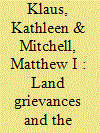

|
|
|
|
|
| Summary/Abstract |
Recent studies have asked why elites resort to violence, yet many overlook the process and dynamics of mobilizing violence. How do politicians convince their supporters to fight? This article argues that in multi-ethnic and democratizing societies where land and property rights are weak and politicized, land grievances can provide leaders with a powerful tool to organize electoral violence. We develop a theory to show how land grievances can give rise to violent mobilization when leaders frame elections as a threat to the land security of supporters or an opportunity to reclaim land or strengthen land rights. Conversely, land grievances are ineffective when citizens do not believe that elections signal a credible threat to their land security or an opportunity to strengthen land rights. We further specify how the type of land grievance shapes the logic and form of violent action. Grievances based on land insecurity shape a pre-emptive logic of violence, while grievances based on competing land claims often shape an opportunistic logic of electoral violence. The article examines the validity of our theory using a comparative case study between zones of escalation and non-escalation of violence during post-electoral crises in Kenya (2007–08) and Côte d’Ivoire (2010–11). By observing the variation between positive and negative cases, the article identifies factors that foment and constrain the mobilization of election violence.
|
|
|
|
|
|
|
|
|
|
|
|
|
|
|
|
| 6 |
ID:
182663
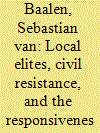

|
|
|
|
|
| Summary/Abstract |
Why is rebel governance more responsive in some areas than in others? In recent years, scholars have started to examine the determinants of rebel governance. Less attention has been given to explaining variation in the responsiveness of rebel governance, that is, the degree to which rebels are soliciting and acting upon civilian preferences in their governance. This article seeks to address this gap by studying local variation in rebel responsiveness. I argue that rebel responsiveness is a function of whether local elites control clientelist networks that allow them to mobilize local citizens. Strong clientelist networks are characterized by local elite control over resources and embeddedness in local authority structures. In turn, such networks shape local elites’ capacity for mobilizing support for, or civil resistance against, the rebels, and hence their bargaining power in negotiations over rebel governance. Drawing on unique interview and archival data collected during eight months of fieldwork, as well as existing survey data, the study tests the argument through a systematic comparison of four areas held by the Forces Nouvelles in Côte d’Ivoire. The analysis indicates that the strength of local elites’ clientelist networks shapes rebel responsiveness. Moreover, it provides support for the theorized civil resistance mechanism, and shows that this mechanism is further enhanced by ethnopolitical ties between civilians and rebels. These findings speak to the burgeoning literature on rebel governance and to research on civil resistance. In addition, the results inform policy debates on how to protect civilians in civil war.
|
|
|
|
|
|
|
|
|
|
|
|
|
|
|
|
| 7 |
ID:
170814


|
|
|
|
|
| Summary/Abstract |
False information, rumours and hate speech can incite violent protest and rioting during electoral periods. To counter such disinformation, United Nations peacekeeping operations (PKOs) routinely organize election-education events. While researchers tend to study how PKOs affect armed group and state behaviour, this study shifts the focus to civilians. It argues that PKOs’ election education reduces violent protest and rioting involving civilians during electoral periods via three pathways. First, learning about PKOs’ electoral security assistance during election-education events may convince people that political opponents cannot violently disturb elections, thereby mitigating fears of election violence. Second, election-education events provide politically relevant information that can strengthen political efficacy and people’s ability to make use of peaceful political channels. Finally, peace messages during election-education events can change people’s calculus about the utility and appropriateness of violent behaviour. Together, these activities mitigate fears, reduce political alienation and counter civilians’ willingness to get involved in violence. To test these expectations, I combine survey data on people’ perceptions and attitudes, events data on violent protest and rioting, and a novel dataset on local-level election-education events carried out by the PKO in Côte d’Ivoire before four elections held between 2010 and 2016. The results show that when the PKO is perceived to be an impartial arbiter, its election-education events have violence-mitigating effects at the individual and subnational levels.
|
|
|
|
|
|
|
|
|
|
|
|
|
|
|
|
| 8 |
ID:
160878
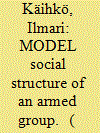

|
|
|
|
|
| Summary/Abstract |
This article investigates the Movement for Democracy in Liberia (MODEL) through a revised Weberian framework that focuses on legitimacy and offers a thick description of the different phases of this armed group. The article argues that the key to fostering cohesion is the harmonization of the micro, meso, and macro levels. This proved a difficult undertaking for the MODEL. Not only did the MODEL lack material resources but it also relied on different and evolving kinds of legitimacy on these levels. With its sources of legitimacy exhausted after the war, the MODEL ceased to exist.
|
|
|
|
|
|
|
|
|
|
|
|
|
|
|
|
| 9 |
ID:
175827
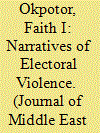

|
|
|
|
|
| Summary/Abstract |
This article addresses post-election violence (PEV) in Africa by drawing on the lived experiences of respondents in Côte d’Ivoire and Nigeria. It takes an actor-centered approach steeped in interpretivism and reflexivity in analyzing Côte d’Ivoire’s 2010–2011 and Nigeria’s 2011 PEV. It examines PEV from the viewpoint of a variety of actors, including political party leaders, party activists, electoral commission officials, non-governmental organization (NGO) officials, academics, scholars, and human rights experts. With attention to methodological and personal positionality, the study draws on interviews conducted in 2014 and 2015. It also analyzes the dominant discourses that contributed to a violent reaction to a contested election outcome, and thus highlights the socially-constructed conditions that allow for the possibility of violence. Salient issues arising from these narratives include: the role of decades-long unresolved violence episodes in fueling PEV, the role of political leaders in exploiting grievances associated with these past violence episodes, and the power of electoral violence prevention strategies targeted at principal actors in curbing the progression to violence.
|
|
|
|
|
|
|
|
|
|
|
|
|
|
|
|
| 10 |
ID:
157860
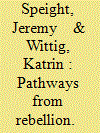

|
|
|
|
|
| Summary/Abstract |
Across diverse liberal war-to-peace transitions, the integration of former armed movements into the post-accord political system has been identified as a significant factor in determining the success of peace processes. There is now a growing literature focusing on rebel-to-party transformations in the aftermath of armed conflict. Despite on-going debates over the long-term implications of rebel-to-party conversions for existing party systems, actual studies focusing on diverse patterns of rebel-party configurations in post-accord transitions remain rare. This article takes a first step to fill this gap by comparing pathways in rebel-party relations in Côte d’Ivoire and Burundi. While the FN in Côte d’Ivoire joined the RDR, an established political party, with FN members running as candidates for the RDR in post-accord elections, the CNDD-FDD in Burundi formed its own party becoming the country’s current ruling party. We develop a theoretical framework analyzing these divergent pathways by exploring how ties between armed movements and pre-conflict political parties shape trajectories of rebel groups during and beyond civil war.
|
|
|
|
|
|
|
|
|
|
|
|
|
|
|
|
| 11 |
ID:
177851


|
|
|
|
|
| Summary/Abstract |
On the basis of 12 months of field research conducted in nine cities in Côte d’Ivoire, this study explores the relationship between demobilization, disarmament and reintegration (DDR) and transitional justice. It finds that suggestions that the two should be totally isolated from one another are both extremely difficult and undesirable in a post-conflict setting where DDR and transitional justice interact frequently and could, in theory, have many positive ramifications for one another. However, contrasting propositions that far-reaching coordination should occur between DDR and transitional justice are not without difficulty. Bringing the two initiatives together is often challenging, particularly at a national level where the political will of post-war governments can be lacking and populations resistant to more comprehensive peacebuilding programmes. Instead, the article proposes, a third, more moderate approach to coordination. It suggests that a bare minimum level of cooperation should be considered a benchmark, ensuring that DDR and transitional justice practitioners are always aware of what is occurring in the other domain. Beyond this, greater cooperation may not be possible, but where it is, it is most likely to be achieved successfully at a local level, between social reintegration and personal reconciliation
|
|
|
|
|
|
|
|
|
|
|
|
|
|
|
|
| 12 |
ID:
190440


|
|
|
|
|
| Summary/Abstract |
West Africa’s Moratorium on Importation, Exportation, and Manufacture of Light Weapons was adopted in 1998, and the Convention on Small Arms and Light Weapons, their Ammunition, and Other Related Materials was adopted in 2006. The Moratorium and the Convention are more than two decades old, respectively. However, there is little knowledge of their effectiveness in reducing arms flow. This research evaluates how ECOWAS members implemented the Moratorium and Convention to determine compliance trends. It uses a theoretical framework of domestic political legitimacy as a crucial mechanism to explain compliance variations. Political legitimacy is imperative for states’ and domestic groups’ behavior, and its dearth can lead to obtaining arms illegally, which the Moratorium and Convention seek to prevent. The empirics use case studies about Ghana and Côte d’Ivoire to infer how political legitimacy variations influence compliance with the agreement.
|
|
|
|
|
|
|
|
|
|
|
|
|
|
|
|
| 13 |
ID:
160896
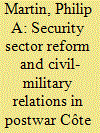

|
|
|
|
|
| Summary/Abstract |
ON JUNE 30, 2017, THE UNITED NATIONS OPERATION in Côte d’Ivoire (ONUCI) reached the end of its mandate after fourteen years of peacekeeping operations. UN officials and Ivorian national leaders framed ONUCI’s departure as another positive step in the country’s postwar recovery, declaring that the return to peace was ‘irreversible’.1 In some ways, this enthusiasm appeared warranted. Since the end of the Second Ivorian Civil War in 2011, which culminated in the arrest of former President Laurent Gbagbo by rebel troops formerly known as the Forces nouvelles, the country has experienced rapid economic recovery: GDP growth averaged 9 percent from 2012 to 2016.2 Government and UN officials have touted the success of the country’s disarmament, demobilization, and reintegration (DDR) programme, which officially processed over 60,000 ex-combatants between 2012 and 2015.3 Within the country’s armed forces, officials point to the integration of former rebels and pro-Gbagbo elements within unified military units as further evidence that Côte d’Ivoire is a model of peacebuilding and security sector reform to be emulated by Africa’s other conflict-torn states.4
|
|
|
|
|
|
|
|
|
|
|
|
|
|
|
|
| 14 |
ID:
148350
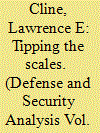

|
|
|
|
|
| Summary/Abstract |
Particularly in African operations, United Nations (UN) peacekeeping forces have faced significant problems in restoring stability. In at least a few situations, unilateral national military interventions have been launched in the same countries. In the cases of Sierra Leone and Côte d’Ivoire, the British and French interventions respectively played a significant role in re-establishing stability. Lessons from these operations suggest that if effective coordination and liaison channels are established, such hybrid unilateral-UN missions can in fact be more successful than “pure” peace operations.
|
|
|
|
|
|
|
|
|
|
|
|
|
|
|
|
| 15 |
ID:
148185
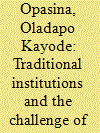

|
|
|
| 16 |
ID:
158030
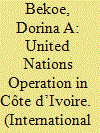

|
|
|
|
|
| Summary/Abstract |
Despite the certification of Côte d’Ivoire’s 2010 presidential elections by the United Nations Operations in Côte d’Ivoire (UNOCI), they resulted in the most violent of Sub-Saharan Africa, in the two decades since the transition to a democratic dispensation. UNOCI and Ivorian authorities embarked on a certification process in order to infuse credibility into a system and institutions divided along religious, regional, and cultural fault lines. Instead, the four months of fighting between the two main political parties nearly plunged the country back into civil war. This paper examines why certification could not provide a credible process; it considers the roles and leverage of the broader international community, to conclude that UNOCI did not have the relevant tools or capacity at its disposal, nor were there adequate incentives to resolve the factors threatening the peacefulness of elections. By prioritizing the holding of elections, without ensuring sufficient levels of peace, security, and inclusivity in Côte d’Ivoire, certification not only failed, but enabled the flourishing of an environment inimical to free, transparent, and credible elections.
|
|
|
|
|
|
|
|
|
|
|
|
|
|
|
|
|
|
|
|
|